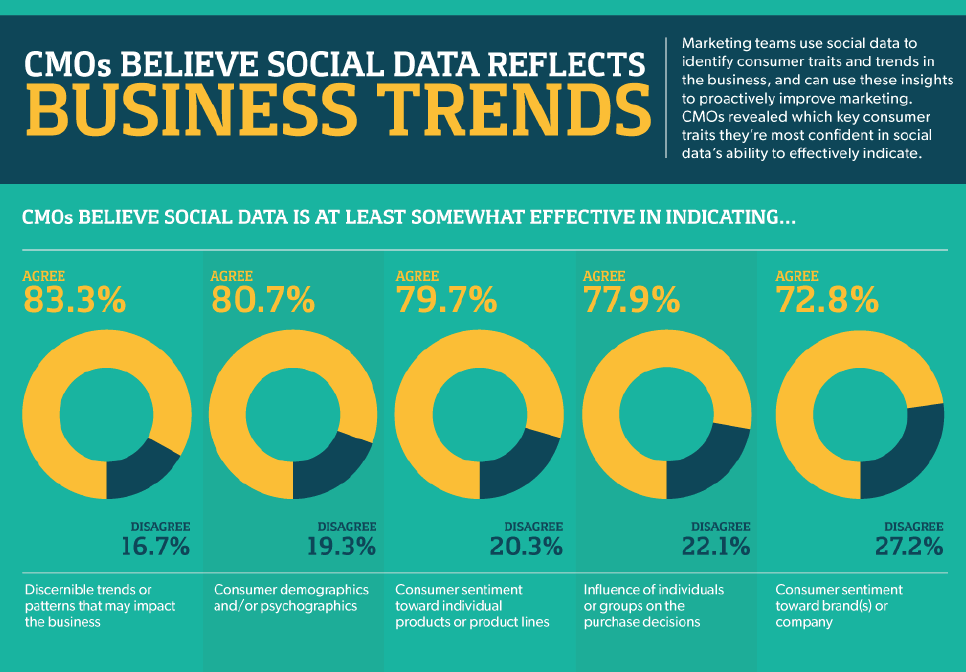Not long ago I wrote an article on the use of social media among CEOs and how many often talk the social media talk on behalf of their brands/companies but very few actually walk the social media walk for their own personal use.
Today comes results of a survey conducted by Bazaarvoice of 100 members of The CMO Club. Now while I realize the sample size is small (100) it is worth nothing that 56.1% of the brands represented have more than $1 billion in annual revenue while another 36% have $100-999 million in annual revenue, and just 7.9% have annual revenue of $0-100 million.
 Entitled “Chief customer advocate: How social data elevates CMOs” the survey and subsequent white paper ”reveals the results of an online survey of 100 members of The CMO Club, which includes CMOs of business-to-consumer and business-to-business organizations.”Key findings include:
Entitled “Chief customer advocate: How social data elevates CMOs” the survey and subsequent white paper ”reveals the results of an online survey of 100 members of The CMO Club, which includes CMOs of business-to-consumer and business-to-business organizations.”Key findings include:- Social (media) data impacts decisions for nearly all CMOs. Almost half of CMOs have used social data to make predictions or forecasts, and nearly nine in 10 say this data has influenced their decisions.
- CMOs use data to drive smarter decisions beyond marketing. While marketing teams and agencies most often uncover the data itself, insights are used in product development, customer experience, sales, and C-level discussions.
- CMOs believe social reveals consumer sentiment and improves brand awareness. CMOs are most confident in social data analysis of product/service sentiment, and in its impact on overall brand loyalty and awareness.
As for the impact CMOs believe social media has on sales:
While I’m not sure why the folks behind this survey/white paper decided to “water down” the confidence quotient, if you will, by inserting the word “somewhat” in the subhead in the chart above, especially when they did not use the word in the headline – but regardless the fact that so many of the CMOs surveyed identified social media as having such a profound impact on sales, as well as brand awareness and loyalty speaks volumes.
It speaks volumes in that CMOs, perhaps unlike their fellow C-suite residents (CEOs), realize that social media is here to stay – yes there are those still on “it’s a fad” bandwagon, and that it can have a significant impact the things that matter most, AKA the bottom line and brand loyalty.
It would also appear that CMOs realize that social media is a direct reflection on the world around them – the world where consumers live, work and play. While not crazy about the use of the word “somewhat” again, the graph below shows that a large number of CMOs surveyed believe that social media is effective for identifying discernible trends among consumers with the word “discernible” being the operative word for sure.
The graph also reveals how CMOs believe that social media does a great job at reflecting consumer sentiment.
CMOs Are “Customer Champions”
Erin Mulligan Nelson, CMO, Bazaarvoice used that term in discussing the findings of the survey, saying “In a consumer-obsessed C-suite, the CMOs are the chief customer advocates and social (media) data is their ultimate weapon. Social data lets CMOs truly know their customers and predict consumers’ future needs before they even have them. Nearly all CMOs now use this data to drive decisions. As the business world re-centers around serving and delighting consumers, social data is turning CMOs into customer champions — and heroes within the C-suite. And as an industry, we have just started to tap into the potential of social data.”
She is dead on when she says that we have just started to tap into the potential of all the social media data of course as we are just now beginning to realize the sheer magnitude and power and scope of the mounds of data. Given the fact that we as consumers now create as much information every two days as we did from the dawn of civilization to 2003, I would say Acxiom CMO Tim Sutherwas correct when he referred to it as a ”tsunami of data” in an article I wrote back in February entitled How To Rein In The Riches Of Big Data.
The aforementioned article also speaks to the inherent dangers brands and businesses face when deciding what to do with all this new found data and the possible legal ramifications therein.
Sources: CMO.com, Bazaarvoice, The CMO Club
Named one of the Top 100 Influencers In Social Media (#41) by Social Technology Review and a Top 50 Social Media Blogger by Kred, Steve Olenski is a freelance copywriter/blogger looking for full-time work. He has worked on some of the biggest brands in the world and has more than 20 years experience in advertising and marketing. He lives in Philly and can be reached via email,Twitter, LinkedIn, or his website.



 As one who has read, dissected and written about many a study regarding social media, brands and consumers, I can tell you I for one was quite surprised to see read the findings of a survey recently conducted by
As one who has read, dissected and written about many a study regarding social media, brands and consumers, I can tell you I for one was quite surprised to see read the findings of a survey recently conducted by